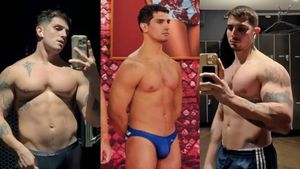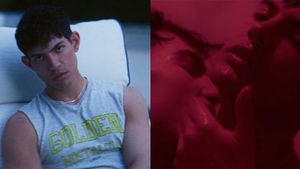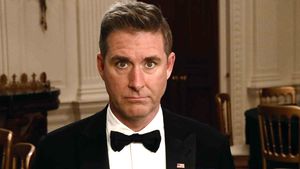The director of Call Me by Your Name has defended his decision to cast straight actors as the film's gay leads.
Luca Guadagnino, in a recent interview with The Independent promoting his new Salvatore Ferragamo biopic, Shoemaker of Dreams, brushed off criticisms for casting Timothée Chalamet as the 17-year-old Elio and Armie Hammer as his older lover Oliver in his adaptation of André Aciman's queer coming-of-age novel.
![]()
"I read too much Freud to be taking seriously these kind of critics," he said. "Meaning that I honestly don’t believe I have the right to decide whether an actor is straight or not. Who am I to know what somebody is thinking of himself or herself within themselves. Yes, Armie is a straight man with a wife and children and the same can be said of Timothée. But do I ask them to swear on their sexuality, on their identities, on their desires, before I cast them? I don’t!"
He continued:
"If I have to cast what people think is the real thing for a role, I wouldn’t be able to cast. I cannot cast a gay man to play Oliver. I have to cast Oliver to play Oliver because the identities of gay men are as multiple as the flowers in the realm of earth. So there is not a gay identity. One person who is gay is completely different to another person who is gay."
"So, if I have to be accurate to this kind of dull remark, I could cast Oliver but Oliver doesn’t exist. He’s a creature of [writer] André Aciman. We go back to the last point I want to make which is that the beauty of acting is the possibility of the creation and embodiment of new selves through the art of acting."
Additionally, Guadagnino compared calls for the authentic casting of gay roles, which due to a history of bias in Hollywood usually go to straight actors, to requiring an actual serial killer to portray Dr. Hannibal Lecter in The Silence of the Lambs.
"Does Mr. Hopkins need to be a serial killer himself to play that role?" asked Guadagnino, referring to Anthony Hopkins.
Guadagnino also responded to criticism from Call Me by Your Name's screenwriter, James Ivory, who claimed his original script had called for full-frontal nudity. In a previous interview, Ivory had called Guadagnino's defense of not having nudity in the film — one notable sex scene pans to the curtains, for example — as an aesthetic decision "bullshit" and "phony." The contracts of Hammer and Chalamet reportedly had no-nudity clauses.
To The Independent, Guadagnino said Ivory was a "little tone-deaf about the situation.”
"Nobody who knows my work can say to me with a straight face that I’m shy about male or female or other gendered nudity," he said. "So the critique or note that James gave was, in a way, devoid of pragmatism or a relationship with the movie itself. My question to him is does this movie need full-frontal male nudity. I don’t think so. It doesn’t."
![]()

































































































































